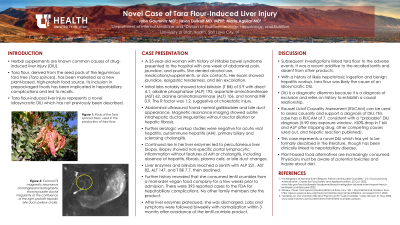Tuesday Poster Session
Category: Liver
P3889 - Novel Case of Tara Flour-Induced Liver Injury
Tuesday, October 24, 2023
10:30 AM - 4:00 PM PT
Location: Exhibit Hall

Has Audio

John Gaumnitz, MD
University of Utah School of Medicine
Salt Lake City, UT
Presenting Author(s)
John Gaumnitz, MD1, Jason DuBroff, MD, MPH1, Maria Aguilar, MD2
1University of Utah School of Medicine, Salt Lake City, UT; 2University of Utah, Salt Lake City, UT
Introduction: Herbal supplements are known common causes of drug-induced liver injury (DILI). Tara flour has been marketed as a new plant-based, high-protein food source. It has been implicated in the recall of pre-packaged food products due to hepatobiliary complications. Tara flour-induced liver injury is a novel idiosyncratic DILI which has not been previously described.
Case Description/Methods: A 35-year-old woman with history of irritable bowel syndrome presented to the hospital with one week of abdominal pain, jaundice, and pruritus. She denied alcohol use, medications/supplements, or sick contacts. Her exam showed jaundice, epigastric tenderness, and skin excoriation. Initial labs notably showed total bilirubin (T Bili) of 5.9 with direct 4.1, alkaline phosphatase (ALP) 192, aspartate aminotransferase (AST) 62, alanine aminotransaminase (ALT) 106, and normal INR 0.9. Magnetic resonance imaging showed subtle intrahepatic ductal irregularities without ductal dilation or hepatic fibrosis. Further serologic work-up were negative for acute viral hepatitis, autoimmune hepatitis (AIH), primary biliary and sclerosing cholangitis. Liver enzymes and bilirubin reached a zenith with ALP 221, AST 82, ALT 147, and T Bili 7.7. Percutaneous liver biopsy showed non-specific portal lymphocytic inflammation without features of AIH or cholangitis, including absence of hepatitis, fibrosis, plasma cells, or bile duct changes. Prior to discharge, she disclosed consuming lentil crumbles from a mail-order vegan food company for a few weeks prior to admission. Over 393 reported cases noted similar hepatobiliary disturbances associated with the product. Subsequent FDA investigations linked tara flour to the adverse events, as it was a recent additive to the lentils and absent from other products. After liver enzymes plateaued, she was discharged. Labs and symptoms were followed closely with normalization of both within 3 months.
Discussion: With a history of likely hepatotoxic ingestion and benign hepatitis work up, tara flour was likely the cause of an idiosyncratic DILI. DILI is a diagnostic dilemma because it is a diagnosis of exclusion and relies on history to establish a causal relationship. This case represents a novel DILI which has yet to be formally described in the literature, though is clinically linked to hepatobiliary disease. Plant-based alternatives are increasingly consumed, thus physicians must be aware of toxicities and inquire about diet.
Disclosures:
John Gaumnitz, MD1, Jason DuBroff, MD, MPH1, Maria Aguilar, MD2. P3889 - Novel Case of Tara Flour-Induced Liver Injury, ACG 2023 Annual Scientific Meeting Abstracts. Vancouver, BC, Canada: American College of Gastroenterology.
1University of Utah School of Medicine, Salt Lake City, UT; 2University of Utah, Salt Lake City, UT
Introduction: Herbal supplements are known common causes of drug-induced liver injury (DILI). Tara flour has been marketed as a new plant-based, high-protein food source. It has been implicated in the recall of pre-packaged food products due to hepatobiliary complications. Tara flour-induced liver injury is a novel idiosyncratic DILI which has not been previously described.
Case Description/Methods: A 35-year-old woman with history of irritable bowel syndrome presented to the hospital with one week of abdominal pain, jaundice, and pruritus. She denied alcohol use, medications/supplements, or sick contacts. Her exam showed jaundice, epigastric tenderness, and skin excoriation. Initial labs notably showed total bilirubin (T Bili) of 5.9 with direct 4.1, alkaline phosphatase (ALP) 192, aspartate aminotransferase (AST) 62, alanine aminotransaminase (ALT) 106, and normal INR 0.9. Magnetic resonance imaging showed subtle intrahepatic ductal irregularities without ductal dilation or hepatic fibrosis. Further serologic work-up were negative for acute viral hepatitis, autoimmune hepatitis (AIH), primary biliary and sclerosing cholangitis. Liver enzymes and bilirubin reached a zenith with ALP 221, AST 82, ALT 147, and T Bili 7.7. Percutaneous liver biopsy showed non-specific portal lymphocytic inflammation without features of AIH or cholangitis, including absence of hepatitis, fibrosis, plasma cells, or bile duct changes. Prior to discharge, she disclosed consuming lentil crumbles from a mail-order vegan food company for a few weeks prior to admission. Over 393 reported cases noted similar hepatobiliary disturbances associated with the product. Subsequent FDA investigations linked tara flour to the adverse events, as it was a recent additive to the lentils and absent from other products. After liver enzymes plateaued, she was discharged. Labs and symptoms were followed closely with normalization of both within 3 months.
Discussion: With a history of likely hepatotoxic ingestion and benign hepatitis work up, tara flour was likely the cause of an idiosyncratic DILI. DILI is a diagnostic dilemma because it is a diagnosis of exclusion and relies on history to establish a causal relationship. This case represents a novel DILI which has yet to be formally described in the literature, though is clinically linked to hepatobiliary disease. Plant-based alternatives are increasingly consumed, thus physicians must be aware of toxicities and inquire about diet.
Disclosures:
John Gaumnitz indicated no relevant financial relationships.
Jason DuBroff indicated no relevant financial relationships.
Maria Aguilar indicated no relevant financial relationships.
John Gaumnitz, MD1, Jason DuBroff, MD, MPH1, Maria Aguilar, MD2. P3889 - Novel Case of Tara Flour-Induced Liver Injury, ACG 2023 Annual Scientific Meeting Abstracts. Vancouver, BC, Canada: American College of Gastroenterology.
